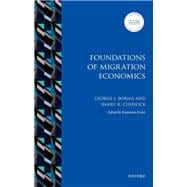This book presents a series of research articles written over the past four decades by leading economists George J. Borjas and Barry R. Chiswick. Borjas and Chiswick are leading experts on the adjustment of immigrants in their destination country and their impact on the economy. Although they worked separately throughout their careers, and did not always agree, their intellectual interaction has greatly increased understanding of the economic consequences of international migration and immigration policy across developed immigrant receiving countries. This volume brings together their contributions for the first time to demonstrate how public policy issues on immigration have evolved over time.
An in-depth analysis of the key issues relating to international migration Foundations of Migration Economics explores the assimilation of immigrants, focusing on the earning changes of immigrants with a longer duration in the host economy; how immigrant networks and ethnic enclaves influence the labor market and linguistic adjustment of immigrants; determinants of language proficiency and to what extent pre-migration skills are effectively employed by the destination; and the effect of immigration on the earnings of earlier waves of immigrants and native-born workers.








